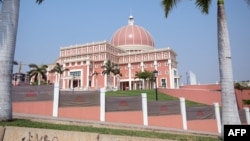Pressure is mounting on the southern African nation of Angola over its human rights record. The European Parliament recently weighed in on what activists say is a deteriorating human rights situation and is demanding the immediate release of dissidents who they say were arrested for political reasons.
This week, several human rights and legal organizations added their voices to the fray, heartily endorsing the European Parliament resolution that condemns the Angolan government’s treatment of dissidents and calls for the release of all political prisoners and human rights defenders.
In recent months, the government has arrested at least 15 activists. Among them is José Marcos Mavungo, who was jailed for organizing a protest. Prosecutors alleged he was fomenting violence, but did not offer any evidence at his trial. In September, he was convicted and sentenced to six years in prison.
Muluka Miti-Drummond is Regional Advocacy Director for the Johannesburg-based Southern Africa Litigation Center (SALC), one of the 15 organizations that recently endorsed the European Parliament's resolution.
She said Angola’s tactics are driven by the government’s need to maintain its hold on power.
“For human rights organizations like SALC, we view this as an unfair restriction of freedom of expression and we believe that this is politically motivated,” said Miti-Drummond.
Dissidents in Angola say they are unhappy over the nation’s persistent poverty and inequality — which belie its status as Africa’s second-largest oil producer — its repressive tactics against free speech and expression, its persistent corruption and the fact that the nation has been ruled by the same man since 1979.
Angola’s state secretary for human rights at the Ministry of Justice reacted to the resolution by calling it “slanderous information,” and saying that the courts were not able to publicly present proof of the detainees’ alleged crimes.
Miti-Drummond notes that the European Parliament resolution does not spell out consequences if Angola declines to heed it — but that the pressure is real.
“The resolution is meant for European countries to discuss the human rights situation in Angola in all all their interactions, you know, in all kind of interactions, diplomatic interactions between European countries and Angola. And so, we believe that for the issue of diplomacy, for the issue of development, it is very important for Angola to take this resolution seriously,” she said.
This is not the only outside pressure on Angola. The 2011 Arab Spring uprisings inspired a groundswell of discontent. And perhaps more importantly, the oil-exporting giant is now feeling the burn of low global oil prices — a force that hits Angolans right in their most sensitive spot: their pockets.




